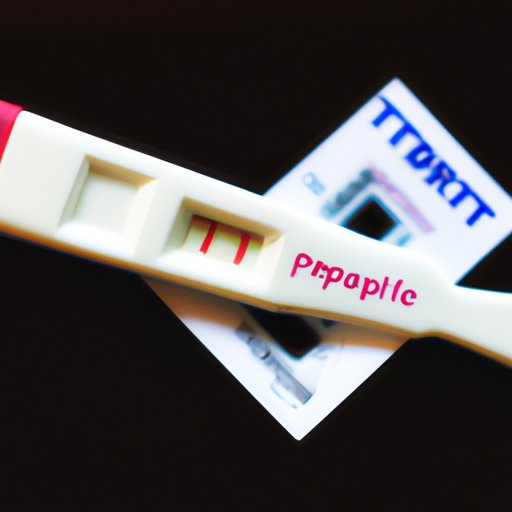Introduction
Conception is the process by which a sperm fertilizes an egg, forming a new individual. A woman may be able to determine if she is pregnant shortly after conception, depending on the type of pregnancy test used. This article will explore the accuracy and timing of taking a pregnancy test after conception, as well as the potential risks and benefits of early testing.
When Can I Take a Pregnancy Test After Conception?
The amount of time it takes for a pregnancy test to detect conception depends on the type of test used. Generally speaking, most home pregnancy tests are designed to detect hCG (human chorionic gonadotropin), a hormone produced during pregnancy, in the urine. These tests can typically detect pregnancy between 10-14 days after conception.
Different types of pregnancy tests have different sensitivity levels, meaning some tests may be able to detect pregnancy earlier than others. For example, blood tests are more sensitive than urine tests and can detect pregnancy as early as 7-10 days after conception. Other tests, such as digital tests, may be able to detect pregnancy earlier than traditional urine tests.
How Soon Can I Know If I’m Pregnant After Conception?
At-home pregnancy tests are generally accurate when used correctly, however there are several factors that can affect their accuracy. Urine tests should not be taken too early, as they may yield false negative results if taken before the body has had time to produce enough hCG. Additionally, tests should be taken first thing in the morning, when the hCG concentration in the urine is highest.
It’s important to read and follow the instructions carefully, as incorrect use of the test can lead to inaccurate results. According to Dr. Mary Jane Minkin, Clinical Professor of Obstetrics, Gynecology, and Reproductive Sciences at Yale University School of Medicine, “Most home pregnancy tests are very accurate — about 97% — if you follow the directions exactly” (WebMD).

Exploring the Timing of Taking a Pregnancy Test After Conception
Taking a pregnancy test within days of conception can be beneficial in certain situations. For instance, women who are trying to conceive may want to confirm their pregnancy as soon as possible. Additionally, women who are experiencing early signs of pregnancy may want to confirm their suspicions.
However, there are some potential risks associated with taking a pregnancy test too soon. For example, if the test yields a false negative result, a woman may mistakenly believe she is not pregnant when in fact she is. Additionally, taking a pregnancy test too early could lead to unnecessary stress and anxiety if the results are inconclusive.
Understanding the Accuracy of Pregnancy Tests After Conception
False positive and false negative results are possible when taking a pregnancy test. False positive results occur when the test indicates that a woman is pregnant when she is not; this is usually caused by a faulty test or incorrect use of the test. False negative results occur when the test indicates that a woman is not pregnant when she is; this is usually caused by taking the test too early.
It’s important to note that even when used correctly, pregnancy tests can still yield inaccurate results. For this reason, it’s best to consult a doctor if the results of a home pregnancy test are inconclusive or uncertain. A doctor can perform a more accurate test to confirm or rule out pregnancy.

The Pros and Cons of Early Pregnancy Testing After Conception
Taking a pregnancy test within days of conception can be beneficial in certain situations. For instance, knowing one’s pregnancy status early on can help a woman make decisions about her health and lifestyle. Additionally, early testing can provide peace of mind for those trying to conceive.
On the other hand, there are some potential risks associated with taking a pregnancy test too soon. As mentioned above, false positive and false negative results are possible, which can lead to confusion and uncertainty. Additionally, taking a pregnancy test too early could lead to unnecessary stress and anxiety.
Conclusion
In conclusion, the accuracy and timing of taking a pregnancy test after conception depends on the type of test used. Most home pregnancy tests are accurate when used correctly and can typically detect pregnancy between 10-14 days after conception. Additionally, it’s important to understand the potential risks and benefits associated with early testing.
Ultimately, it’s best to consult a doctor if the results of a home pregnancy test are inconclusive or uncertain. A doctor can perform a more accurate test to confirm or rule out pregnancy.
(Note: Is this article not meeting your expectations? Do you have knowledge or insights to share? Unlock new opportunities and expand your reach by joining our authors team. Click Registration to join us and share your expertise with our readers.)
